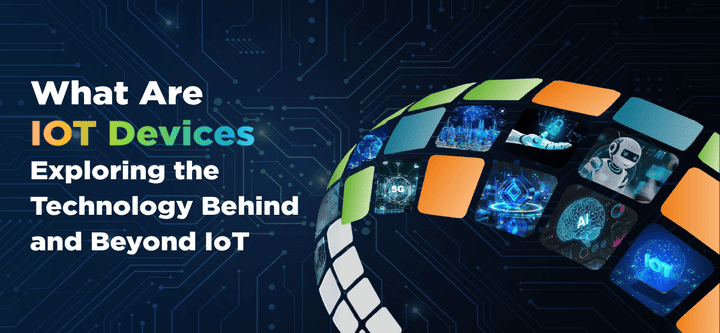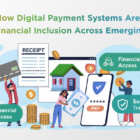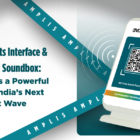From smart thermostats that learn our routines to industrial machines that predict their own maintenance needs — IoT devices have already reshaped our lives in more ways than we notice. As the world becomes increasingly connected, the Internet of Things (IoT) is no longer just a buzzword; it’s the digital nervous system powering the next industrial, commercial and personal revolutions.
As of Q1 2025, the IoT industry has become one of the fastest-growing tech sectors, with over 17.1 billion active IoT connections globally, according to the IoT Analytics 2025 Market Update published in March. This blog explores what IoT devices are, the technologies that make them tick, how they’re transforming industries and what lies beyond the horizon.
Bits to Things — What Are IoT Devices?
At its core, IoT (Internet of Things) refers to the vast network of physical objects embedded with sensors, software and other technologies that enable them to connect, collect and exchange data with other devices and systems over the Internet.
These IoT devices range from consumer products like smartwatches, smart TVs and wearables to mission-critical industrial assets like remote telemetry units, fleet trackers, energy meters and biometric authentication systems — many of which are integral to the Evolute ecosystem.
Accenture’s 2025 Global Tech Vision Report (released in February) describes IoT as the “invisible infrastructure of our digital era.” What makes IoT powerful is not just the connection — it’s the insights and automation driven by the data it generates.
Connect, Detect and Perfect – The Tech Behind IoT
IoT devices rely on a fusion of multiple technologies and each plays a vital role:
1. Sensors: The Senses of Machines
Sensors are at the heart of every IoT device. They capture real-time data such as temperature, pressure, motion, light, humidity and more. A 2025 report by Statista estimates the sensor market in IoT alone is worth over USD 48 billion, projected to grow at 14.2% CAGR.
2. Connectivity Protocols: The Digital Dialects
For an IoT device to send its data, it needs connectivity — via Wi-Fi, Bluetooth, LPWAN (LoRa, NB-IoT), 5G, or satellite. The choice depends on range, data size and energy requirements. With the rise of private 5G networks, enterprises now demand faster, low-latency communications for IoT applications.
3. Edge Computing: Brain at the Border
Instead of sending data back and forth to the cloud, edge computing processes data locally on the device or a nearby gateway. In 2025, Gartner predicts over 50% of enterprise data will be processed at the edge, significantly improving speed and reducing bandwidth costs.
4. AI & ML: Smart Data Gets Smarter
The real magic begins when AI (Artificial Intelligence) and Machine Learning models analyze IoT data to detect anomalies, forecast failures, or optimize energy usage. For example, Evolute’s smart payment terminals integrate machine intelligence to reduce transactional downtime and enhance uptime efficiency.
From Homes to Hubs – Where IoT Devices Thrive
1. Smart Cities: Lights, Traffic, Action!
Urban areas globally are racing toward smart-city adoption. As per the WEF April 2025 report, cities like Dubai, Singapore and Bengaluru are deploying smart traffic sensors, automated lighting and connected waste bins to optimize infrastructure.
- Stat: The smart city IoT market will exceed USD 390 billion by 2025 (MarketsandMarkets).
2. Healthcare: Remote Healing Machines
From glucose monitors to connected inhalers, IoT devices enable real-time health tracking and proactive care. According to a Frost & Sullivan March 2025 study, remote patient monitoring devices have reduced hospital readmissions by 23% in developed economies.
3. Industrial IoT (IIoT): The Fourth Revolution
Manufacturing floors are becoming digital twins of their physical counterparts. IoT-driven predictive maintenance alone is saving industries USD 40 billion annually (McKinsey, Jan 2025). Evolute’s IoT-enabled energy meters help optimize usage and detect anomalies, especially critical for decentralized energy setups.
4. Retail & Fintech: Shopping Smarter, Paying Faster
IoT-powered POS terminals, NFC-enabled checkout kiosks and smart inventory systems are revolutionizing retail. In the fintech space, Evolute’s IoT-based micro-ATMs and connected biometric devices provide secure, last-mile banking access, particularly in rural India.
“IoT is not just about devices — it’s about outcomes. What you measure, you can improve.” – Satya Nadella, CEO of Microsoft
2025 Trends to Track – What’s New in the IoT View?
Cybersecurity Becomes Paramount
A study by Kaspersky (Feb 2025) revealed a 17% rise in IoT-related cyberattacks in just the first two months of this year. Secure hardware and firmware updates over-the-air (FOTA) are becoming standard across enterprise-grade IoT solutions.
Interoperability is the New Gold
With billions of devices from different OEMs, interoperability standards like Matter, MQTT and OPC UA are gaining massive traction to enable seamless cross-device communication.
AIoT – The AI and IoT Convergence
By merging AI with IoT (AIoT), businesses are deploying self-learning systems that adapt and improve over time. Evolute’s embedded AI in fintech terminals is a shining example of this trend, optimizing operations and reducing human intervention.
Risks, Ethics & Future Picks – Beyond the Buzz
While IoT’s promise is immense, it comes with its baggage:
- Privacy Concerns: Over-collection of personal data from wearables or home devices has led to multiple policy reviews globally. The India Data Protection Bill 2025 now mandates explicit user consent before data sharing.
- Device Longevity: Many devices become obsolete quickly. Companies like Evolute now focus on modular designs and firmware upgradability, ensuring devices remain future-ready.
- Digital Divide: As of 2025, 2.7 billion people worldwide still lack access to digital technologies (ITU Report). IoT inclusivity is becoming a priority, especially in sectors like rural banking, health and agriculture.
Evolute Group – Pioneering IoT-Powered Innovation Across Sectors
At the forefront of India’s digital transformation, Evolute Group leverages cutting-edge IoT technologies to power smart, secure and scalable solutions across fintech, energy and industrial automation. With a robust portfolio that includes IoT-enabled micro-ATMs, biometric authentication systems, Evolute bridges critical infrastructure gaps across rural and urban landscapes. Its focus on modular design, remote device management and AI integration ensures future-ready products that meet global standards of efficiency, reliability and compliance. Whether enabling financial inclusion at the last mile or optimizing industrial energy use, Evolute’s IoT-driven approach is transforming how businesses and governments connect, compute and create value in real-time.
The Road Ahead – What’s Next for IoT Devices?
As we step into an era of ambient computing, where technology blends invisibly into daily life, IoT devices are expected to become even more intuitive, autonomous and indispensable.
What’s on the horizon:
- Quantum IoT – Using quantum cryptography for ultra-secure IoT networks.
- Bio-IoT – Merging biotechnology with IoT for applications like ingestible sensors.
- Sustainable IoT – Focus on low-power hardware, green components and recyclable materials.
The real value of IoT lies not in the things but in the insights they generate, the efficiencies they drive and the equity they can enable — when done right.
In Summary: What You Should Remember
- IoT devices are physical objects embedded with sensors and connectivity to collect and exchange data.
- As of 2025, there are 17.1 billion active IoT connections globally.
- Major enablers include sensors, 5G, edge computing, AI and standard communication protocols.
- Industries benefiting include healthcare, smart cities, fintech, retail and manufacturing.
- Key trends: AIoT, cybersecurity, interoperability and sustainable hardware.
- Risks include privacy issues, obsolescence and digital inequality — being actively addressed through policy and innovation.
If you’re in fintech, manufacturing, or infrastructure – now is the time to plug into the power of IoT. Evolute Group continues to push boundaries with smarter, scalable and secure IoT-enabled solutions.
Stay connected. Stay ahead.





